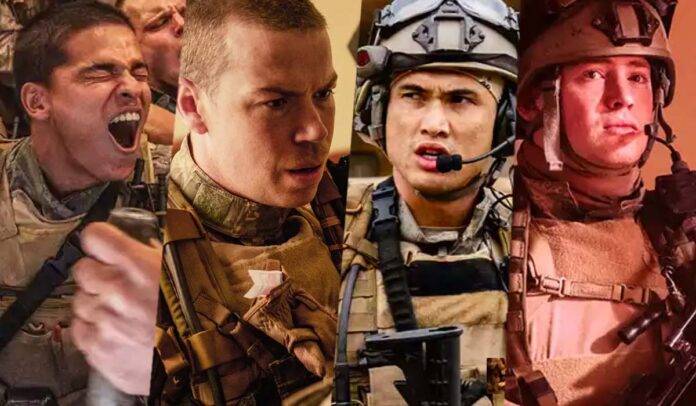A pulse-pounding, boots-on-the-ground thriller about the hells of modern warfare and the bonds of brotherhood, told in an immersive, anxiety-riddled real-time, A24’s “Warfare” drama is as intense as an experience as you’ll ever get in a theater. Based on the memory of real-life Navy SEALs, including one who was there, combat veteran turned film military advisor Ray Mendoza, the harrowing film is co-written and directed by Mendoza and filmmaker Alex Garland (“Ex Machina,” “Annihilation”). The follow-up to Garland’s equally intense “Civil War,” in which Medoza served as a military supervisor, the film is visceral, intense and utterly gripping.
READ MORE: The 100 Most Anticipated Films Of 2025
However, unlike “Civil War,” the explosive actioner does not have much to say and has little on its mind other than presenting the viewer with a punishing and super tense cinematic experience approximating just how brutal it must feel to be in the middle of combat.
Furthermore, it’s 2025, and we’re not stopping to think about modernly relevant topics like illegal incursions, unjust occupancy, invading nations, imperialism and might over right? Are we still treating people in the Middle East as faceless, nameless insurgents who are essentially just target practice for “our boys”? In this regard, “Warfare” isn’t much different from most American war films that portray U.S. soldiers as heroes and dehumanize enemies by presenting them as impersonal, featureless, disposable figures, like in Ridley Scott’s exhausting but hollow “Black Hawk Down” or even Michael Bay’s “13 Hours.”
Based on the memories of a dangerous mission in Ramadi, Iraq, in 2006, “Warfare” follows a Navy SEAL platoon on a surveillance mission gone awry and wrong through insurgent territory.
Narratively, there’s not much to the story, and the film often feels like a reenacted transcript of what occurred. The detachment, led by Will Poulter, who plays an Officer in Charge of the operation, surreptitiously, by the cover of a night raid, breaks into the house of a family of Iraqi civilians, fortifying their home for the strategic position.
While the soldiers, played by actors that include D’Pharaoh Woon-A-Tai as Mendoza alongside Cosmo Jarvis, Kit Connor, Finn Bennett, Taylor John Smith, Michael Gandolfini, Adain Bradley, Noah Centineo, Evan Holtzman, Henry Zaga, Joseph Quinn, Charles Melton, shoot the shit, protect their perimeter and monitor the situation, it doesn’t take long for the locals to discover that their neighbors’ house has fallen too silent.
Soon, suspicious reconnoitering activity is spotted. Soon enough, the noncombatants of the Ramadi streets have vanished, and the U.S. soldiers are nervously bracing themselves for the insurrectionary attack to pop off.
From there, “Warfare” is about 70 minutes of concentrated assault, Al-Qaeda aggression and defensive maneuvers. The platoon finds themselves under fire, pinned down, and trapped, and a brazen escape in the middle of the movie causes ghastly casualties and a retreat back inside.
A film like this could easily be fashioned incredibly kinetic and frenzied visually. Still, the highlight of “Warfare” is just how relatively patient the filmmaking is, free of the obnoxious quick cuts and vertiginous shaky camera that typify these movies and how the horrors of war are depicted. One of the movie’s greatest cinematic strengths is its keen understanding of sound as a filmic ace up its sleeve, constantly using sound, or lack thereof, as a deadly weapon in the overall arsenal. Mendoza and Garland’s film communicates the confusion of war without becoming visually perplexing for the viewer. Experientially, “Warfare” is just brutalizing and excruciating; combat is definitely hell on earth, and it’s easy to see why so many soldiers come back riddled with psychological problems. The film is practically a pre-advertisement for post-traumatic stress syndrome.
And many of the actors are brilliantly convincing. Poulter, as the lead officer who gets “all f*cked up” in a bombing and unable to lead, is great. Cosmo Jarvis (“Shōgun”) evinces why he’s quickly rising up the Hollywood A-list, and as the de-facto lead, D’Pharaoh Woon-A-Tai (“Reservation Dogs”) proves why he’s earned his break-out status. And, of course, Joseph Quinn, already probably the biggest name in the cast now, is excellent as a viciously injured soldier.
Yet lesser-known actors tend to steal the show. Kit Connor (“Heartstopper”) is one of the overly chatty rookies utterly terrified by the distressing onslaught. As one of the snipers, Taylor John Smith (“Where The Crawdads Sing”) also seems destined for bigger and better things. It’s a film that everyone seems to have wanted to be a part of, even despite minor roles. Quinn’s role is definitely small and supporting. Noah Centineo, who leads his own Netflix show, is just one of many in the background, and Golden Globe nominee Charles Melton is yet another thespian with a generally tiny role in the ensemble.
But ending just as quickly as it began with a dubious ending, “Warfare” feels like an endless barrage that suddenly disappears and has little deeper meaning.
Acting as an honoring acknowledgment to wounded SEAL Elliott Miller, one of Mendoza’s real-life soldier buddies, the film’s post-script features a tribute that lionizes him and “the heroes” on-set and alongside the actors that played them. But given how little consideration the film has for anyone or anything other than the soldiers and what they endured, this accolade falls flat and even leaves one with a sour taste in the mouth (especially given how the film hasn’t romanticized anything else throughout; a jarring transition).
Taken on its own, without context, “Warfare” is fierce; the film’s daring evacuation finale is one of many incredibly pulse-pounding sequences. “Warfare” may sharply communicate what it’s like to be under fire, and those looking for bruising action will be exhilarated by the electricity it generates. But anyone asking for some complexity beyond these are the boys that answered the call to go to war will be left decidedly SOL. [B-]
“Warfare” opens in theaters April 11 via A24.



